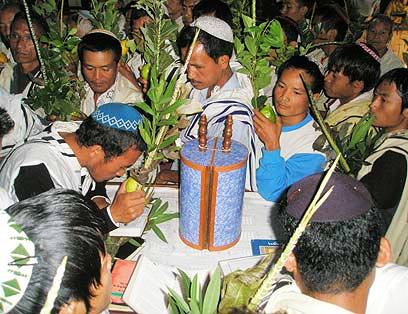India may soon lose its unique Jewish community living in the Northeast, as Israel plans to help their en-masse migration to ‘the promised land’.
The Israeli government set aside eight million shekels to settle 712 members of the Bnei Menashe, a religious group from India which claims Jewish roots, in the Holy Land. The decision was reported in Israeli media on last week.
The Bnei Menashe tribe numbers around 9,000 members.They last had contact with the Jewish people thousands of years ago, according to their oral history. Genetic testing has recently substantiated their unbroken genealogical connection with Israel.

The Bnei Menashe live in northeast India, in an area situated between Myanmar and Bangladesh. Also known as the Shinlung, the Bnei Menashe have an oral tradition, passed down for 2,700 years, which describes how the Assyrians invaded the Northern Kingdom of Israel in 721 BCE and took them into slavery.
According to their tradition, they escaped slavery and fled to Persia, and then Afghanistan. The Bnei Menashe later migrated toward Hindu-Kush and Tibet, eventually reaching Kaifeng in East Central China around 240 BCE.
In 100 CE, the Bnei Menashe were expelled from China. Some fled down the Mekong River into Vietnam, the Philippines, Siam, Thailand and Malaysia. Others went to Burma and westwards to India.
The Bnei Menashe have always observed mitzvot (Torah commandments) and lived as Jews in every respect, and there are over 50 synagogues throughout northeastern India. Several hundred members of the community have already immigrated to Israel, and thousands more clamour to join them.
Israel’s Absorption Ministry gave responsibility for the ‘aliyah’ and resettling of the 712 Bnei Menashe members to Shavei Israel, a non-profit outreach organization that helps people around the world who are descendants of Jews in order to strengthen their connection with Israel.
Shavei will make arrangements with the local Indian government and fly the community from India to Israel. After the Indian Jews arrive, the organization will also be responsible for all aspects of their integration.
Michael Freund, founder and chairman of Shavei Israel, first heard of the Bnei Menashe 15 years ago when he was working as a deputy in Prime Minister Benjamin Netanyahu’s communications office. Freund received a letter from the Bnei Menashe, claiming they were the long-lost descendants of the tribe of Menashe, and one of the Ten Lost Tribes of Israel. They asked for his help in returning to the Promised Land.
Though Israel is eager to help long-lost brethren return to their homeland, the absorption process is difficult and has not always been successful. Almost the entire population of Ethiopian Jews was brought to Israel in multiple airlifts, but their integration into Israeli society suffered serious shortcomings.
Freund explained the challenge of resettling long-lost Jews in Israel. “When we started Shavei, I saw the need for establishing a comprehensive absorption model together with the government,” Freund told Israeli media.
“A lot of time and planning went into this model. We consulted with experts in the field and as a result, the Bnei Menashe are considered a model for success,” Freund explained. “All of the communities have asked for more immigrants from the group, and other communities have heard of the success of the program and have asked to take part.”
Over 3,000 Bnei Menashe and tens of thousands new immigrants from other communities have made aliyah to Israel, with the help of organizations like Shavei and the Israeli government.
The prophetic project has diplomatic implications, as it brings Israel and India even closer, say Israeli media. In October last year, Prime Minister Benjamin Netanyahu called the Bnei Menashe a “living bridge between our two peoples” in his speech at the special Knesset session in honour of the president of India, Pranab Mukherjee.


